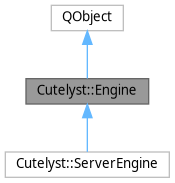 |
cutelyst 4.3.0
A C++ Web Framework built on top of Qt, using the simple approach of Catalyst (Perl) framework.
|
 |
cutelyst 4.3.0
A C++ Web Framework built on top of Qt, using the simple approach of Catalyst (Perl) framework.
|
The Cutelyst Engine. More...
#include <Cutelyst/Engine>

Signals | |
| void | processRequestAsync (Cutelyst::EngineRequest *request) |
Public Member Functions | |
| Engine (Application *app, int workerCore, const QVariantMap &opts) | |
| virtual | ~Engine () |
| Application * | app () const |
| QVariantMap | config (const QString &entity) const |
| bool | isZeroWorker () const |
| QVariantMap | opts () const |
| void | processRequest (EngineRequest *request) |
| void | setConfig (const QVariantMap &config) |
| int | workerCore () const |
| virtual int | workerId () const =0 |
 Public Member Functions inherited from QObject Public Member Functions inherited from QObject | |
| QObject (QObject *parent) | |
| bool | blockSignals (bool block) |
| const QObjectList & | children () const const |
| QMetaObject::Connection | connect (const QObject *sender, const char *signal, const char *method, Qt::ConnectionType type) const const |
| void | deleteLater () |
| void | destroyed (QObject *obj) |
| bool | disconnect (const char *signal, const QObject *receiver, const char *method) const const |
| bool | disconnect (const QObject *receiver, const char *method) const const |
| void | dumpObjectInfo () const const |
| void | dumpObjectTree () const const |
| QList< QByteArray > | dynamicPropertyNames () const const |
| virtual bool | event (QEvent *e) |
| virtual bool | eventFilter (QObject *watched, QEvent *event) |
| T | findChild (const QString &name, Qt::FindChildOptions options) const const |
| QList< T > | findChildren (const QRegularExpression &re, Qt::FindChildOptions options) const const |
| QList< T > | findChildren (const QString &name, Qt::FindChildOptions options) const const |
| QList< T > | findChildren (Qt::FindChildOptions options) const const |
| bool | inherits (const char *className) const const |
| void | installEventFilter (QObject *filterObj) |
| bool | isQuickItemType () const const |
| bool | isWidgetType () const const |
| bool | isWindowType () const const |
| void | killTimer (int id) |
| virtual const QMetaObject * | metaObject () const const |
| void | moveToThread (QThread *targetThread) |
| QString | objectName () const const |
| void | objectNameChanged (const QString &objectName) |
| QObject * | parent () const const |
| QVariant | property (const char *name) const const |
| Q_CLASSINFO (Name, Value) | |
| Q_DISABLE_COPY (Class) | |
| Q_DISABLE_COPY_MOVE (Class) | |
| Q_EMIT Q_EMIT | |
| Q_ENUM (...) | |
| Q_ENUM_NS (...) | |
| Q_ENUMS (...) | |
| Q_FLAG (...) | |
| Q_FLAG_NS (...) | |
| Q_FLAGS (...) | |
| Q_GADGET Q_GADGET | |
| Q_GADGET_EXPORT (EXPORT_MACRO) | |
| Q_INTERFACES (...) | |
| Q_INVOKABLE Q_INVOKABLE | |
| Q_MOC_INCLUDE Q_MOC_INCLUDE | |
| Q_NAMESPACE Q_NAMESPACE | |
| Q_NAMESPACE_EXPORT (EXPORT_MACRO) | |
| Q_OBJECT Q_OBJECT | |
| Q_PROPERTY (...) | |
| Q_REVISION Q_REVISION | |
| Q_SET_OBJECT_NAME (Object) | |
| Q_SIGNAL Q_SIGNAL | |
| Q_SIGNALS Q_SIGNALS | |
| Q_SLOT Q_SLOT | |
| Q_SLOTS Q_SLOTS | |
| T | qobject_cast (const QObject *object) |
| T | qobject_cast (QObject *object) |
| QT_NO_NARROWING_CONVERSIONS_IN_CONNECT QT_NO_NARROWING_CONVERSIONS_IN_CONNECT | |
| void | removeEventFilter (QObject *obj) |
| void | setObjectName (const QString &name) |
| void | setObjectName (QAnyStringView name) |
| void | setParent (QObject *parent) |
| bool | setProperty (const char *name, const QVariant &value) |
| bool | signalsBlocked () const const |
| int | startTimer (int interval, Qt::TimerType timerType) |
| int | startTimer (std::chrono::milliseconds time, Qt::TimerType timerType) |
| QThread * | thread () const const |
Static Public Member Functions | |
| static const char * | httpStatusMessage (quint16 status, int *len=nullptr) |
| static QVariantMap | loadIniConfig (const QString &filename) |
| static QVariantMap | loadJsonConfig (const QString &filename) |
 Static Public Member Functions inherited from QObject Static Public Member Functions inherited from QObject | |
| QMetaObject::Connection | connect (const QObject *sender, const char *signal, const QObject *receiver, const char *method, Qt::ConnectionType type) |
| QMetaObject::Connection | connect (const QObject *sender, const QMetaMethod &signal, const QObject *receiver, const QMetaMethod &method, Qt::ConnectionType type) |
| QMetaObject::Connection | connect (const QObject *sender, PointerToMemberFunction signal, const QObject *context, Functor functor, Qt::ConnectionType type) |
| QMetaObject::Connection | connect (const QObject *sender, PointerToMemberFunction signal, const QObject *receiver, PointerToMemberFunction method, Qt::ConnectionType type) |
| QMetaObject::Connection | connect (const QObject *sender, PointerToMemberFunction signal, Functor functor) |
| bool | disconnect (const QMetaObject::Connection &connection) |
| bool | disconnect (const QObject *sender, const char *signal, const QObject *receiver, const char *method) |
| bool | disconnect (const QObject *sender, const QMetaMethod &signal, const QObject *receiver, const QMetaMethod &method) |
| bool | disconnect (const QObject *sender, PointerToMemberFunction signal, const QObject *receiver, PointerToMemberFunction method) |
| QString | tr (const char *sourceText, const char *disambiguation, int n) |
Protected Member Functions | |
| Headers & | defaultHeaders () |
| bool | initApplication () |
| bool | postForkApplication () |
 Protected Member Functions inherited from QObject Protected Member Functions inherited from QObject | |
| virtual void | childEvent (QChildEvent *event) |
| virtual void | connectNotify (const QMetaMethod &signal) |
| virtual void | customEvent (QEvent *event) |
| virtual void | disconnectNotify (const QMetaMethod &signal) |
| bool | isSignalConnected (const QMetaMethod &signal) const const |
| int | receivers (const char *signal) const const |
| QObject * | sender () const const |
| int | senderSignalIndex () const const |
| virtual void | timerEvent (QTimerEvent *event) |
Friends | |
| class | Application |
| class | Response |
Additional Inherited Members | |
 Public Attributes inherited from QObject Public Attributes inherited from QObject | |
| typedef | QObjectList |
 Properties inherited from QObject Properties inherited from QObject | |
| objectName | |
This class is responsible receiving the request and sending the response. It must be reimplemented by real HTTP engines due some pure virtual methods.
The subclass must create an engine per thread (worker core), if the Application passed to the constructor has a worker core greater than 0 it will issue a new Application instance, failing to do so a fatal error is generated (usually indicating that the Application does not have a Q_INVOKABLE constructor).
|
explicit |
Constructs an Engine object, where app is the application that might be used to create new instances if workerCore is greater than 1, opts is the options loaded by the engine subclass.
| app | The application loaded |
| workerCore | The thread number |
| opts | The configuation options |
Definition at line 42 of file engine.cpp.
References app(), QObject::connect(), opts(), processRequest(), processRequestAsync(), Qt::QueuedConnection, and workerCore().
|
virtual |
Destroys the Engine object.
Definition at line 55 of file engine.cpp.
| Application * Engine::app | ( | ) | const |
Returns the application associated with this engine.
Definition at line 60 of file engine.cpp.
Referenced by Engine().
| QVariantMap Engine::config | ( | const QString & | entity | ) | const |
Returns a map of key value pairs for the configuration entitiy (section) from your application’s configuration file.
Definition at line 263 of file engine.cpp.
Referenced by Cutelyst::MemcachedSessionStore::MemcachedSessionStore(), setConfig(), Cutelyst::Session::setup(), Cutelyst::CSRFProtection::setup(), Cutelyst::Memcached::setup(), Cutelyst::StaticCompressed::setup(), Cutelyst::LangSelect::setup(), and Cutelyst::Application::setup().
|
protected |
This is the HTTP default response headers that each request gets.
Definition at line 245 of file engine.cpp.
|
static |
Returns the HTTP status message for the given status. If len is not a nullptr, the length of the returned string will be stored to *len.
Definition at line 104 of file engine.cpp.
References QByteArray::number().
Referenced by Cutelyst::ProtoRequestHttp::writeHeaders().
|
protected |
This method inits the application and calls init on the engine. It must be called on the engine's thread. Returns true on success.
Definition at line 73 of file engine.cpp.
References QThread::currentThread(), and QObject::thread().
Referenced by Cutelyst::ServerEngine::init().
|
inline |
Returns true if this is the Zero worker, ie if workerId() == 0 and workerCore() == 0.
Definition at line 156 of file engine.h.
References workerCore(), and workerId().
|
static |
Returns a QVariantMap with the INI parsed from filename.
Definition at line 275 of file engine.cpp.
References QSettings::beginGroup(), QSettings::childGroups(), QSettings::childKeys(), QSettings::endGroup(), QSettings::IniFormat, QList::insert(), QSettings::NoError, QSettings::status(), and QSettings::value().
|
static |
Returns a QVariantMap with the JSON parsed from filename.
Definition at line 299 of file engine.cpp.
References QJsonDocument::fromJson(), QFile::open(), QIODevice::readAll(), QIODeviceBase::ReadOnly, QIODeviceBase::Text, QVariant::toMap(), and QJsonDocument::toVariant().
| QVariantMap Engine::opts | ( | ) | const |
Returns the engine options set in the constructor.
Definition at line 257 of file engine.cpp.
Referenced by Engine().
|
protected |
Subclasses must be call after the engine forks by the worker thread, if no forking is involved it must be called once the worker thread has started.
For convenience QThread::currentThread() has it's object name set with the worker core number.
Definition at line 90 of file engine.cpp.
References QThread::currentThread(), QString::number(), and QObject::setObjectName().
| void Engine::processRequest | ( | EngineRequest * | request | ) |
Process the request. The caller must delete the context when the request is finished.
This method allows for engines to keep the Context alive while processing websocket data.
Definition at line 251 of file engine.cpp.
Referenced by Engine().
|
signal |
| void Engine::setConfig | ( | const QVariantMap & | config | ) |
Sets the configuration to be used by Application.
Definition at line 269 of file engine.cpp.
References config().
| int Engine::workerCore | ( | ) | const |
Returns the worker core set when constructing the engine.
Each worker process migth have a number of worker cores (threads), a single process with two worker threads will return 0 and 1 for each of the thread respectively.
Definition at line 67 of file engine.cpp.
Referenced by Engine(), isZeroWorker(), and Cutelyst::Application::setup().
|
pure virtual |
Reimplement this to get the workerId of the engine subclass, this is the same as processes id.
The id is the number of the spawned engine process, a single process workerId = 0, two process 0 for the first 1 for the second.
Implemented in Cutelyst::ServerEngine.
Referenced by isZeroWorker().
|
friend |